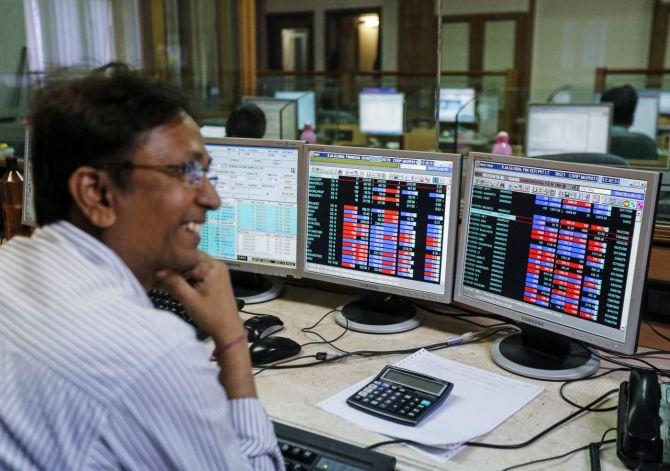'At this time, staying in the game is more important.'
'If we do that, then wealth can be generated.'

"Arm yourself with tons of patience and low expectations because only that will help you navigate through these uncertain times," Amit Kumar Gupta, portfolio manager, Adroit PMS, tells Prasanna D Zore/Rediff.com in the concluding segment of a two-part interview.
Would you agree with this school of market players pitching for a ban on short selling to contain the financial contagion worldwide? Some countries have already gone for it...
I don't think it is even possible for short selling to be banned given that we do not have (trading in) underlying here and most of our shorting is via F&O (futures and options) way.
Those countries who are doing it (banned short selling) work in a different lending mechanism.
Moreover, the selling ban or even shutting down exchanges doesn't work really well. It has been done in exceptional circumstances like 9/11 or floods in US or 2001 BSE surveillance case and that should be the case going forward.
Short selling ban brings only temporary relief and eventually lead to illiquid and choppy market with evaporated volumes.
It also hinders price discovery and kills arbitrage and hedging opportunities.
SEBI (the stock market regulator Securities and Exchange Board of India) has already implemented measures to contain the volatility by hiking margins and net limit positions.
Talking about India, while the crash in crude prices will certainly ring-fence its balance of payments and dollar outflows, what other macroeconomic measures should the government, take on the fiscal front, and the banking regulator, the RBI, take on the monetary front adopt to take this economic downturn head on?
RBI has been proactively conducting OMOs (open market operations) and Long Term Repo Operation, or LTRO, in past month to provide abundant liquidity.
The liquidity was tightened due to advance tax outflows, rabi crop harvesting schedule and SBI cards IPO which saw huge interest.
The latest policy tools brought into use by RBI like the LTRO and postponement of gilt maturities through Operation Twist (launched sometime in December 2019 by the RBI, Operation Twist involves simultaneous purchase and sale of government bonds to impart suck in and suck out liquidity into the system and influence interest rate movement to facilitate credit off take) have added significant monetary stimulus to the financial system.
LTRO has virtually pegged the short term cost of funds for banks to the repo rate (the benchmark rate at which the RBI lends money to banks) of 5.15 per cent.
Operation Twist has on one hand reduced the amount of gross borrowing by the government through postponement of maturities, on the other hand it has eased the long term borrowing cost for corporate by keeping benchmark yields under check.
Transmission of policy is likely to be accelerated and effective.
The fiscal side remains tight with all divestment plans coming to a virtual halt due to lack of investor interest and spread of COVID-19.
Rise in excise duty on petrol and diesel may not be sufficient.
Divestment of Air India -- due to halt in operations -- and BPCL -- due to fall in crude prices -- both look difficult at this time.
The government needs to come out with innovative measures to support industries impacted by the virus shutdown.
The equity markets in India have already nosedived more nearly 35 to 40 per cent from their peak in January 2020. How much more pain do you foresee going ahead or have we reached a bottom, even if temporary, till the next shock manifests itself?
Unfortunately, no one has a crystal ball to predict how long the virus impact is going to last. One can hope that a medical breakthrough will come in the next few weeks and also we are able to test more people on daily basis.
Given that many states are and will be in a lockdown, the collateral damage from the business disruption may impact many micro businesses materially.
One quarter of poor activity may be sufficient for these micro businesses to slip into a debt spiral.
The collective impact of damage to these businesses shall be visible in the balancesheets of financial institutions and P&L of consumer product manufacturers in the near term.
So far, the monetary and fiscal response has been limited and one hopes to see more on this quickly.
Technically, after four years of strong run, the trend in Indian equities appears to be breaking. The monthly closing for March would be very critical in assessing the future course of the markets.
A monthly close below 9506 would open the floodgates.
A close below this critical level may potentially correct the entire gains from February 2016 lows of 6825.
How should retail investors navigate the unprecedented volatility that has gripped the stock markets? Your advice for them...
Bad times don't last. The recency bias should be avoided in such cases.
The mood in late December and till early February was euphoric. Investors were becoming less risk averse and even poured money into the mid and small caps. So this has been sudden turn for most participants.
At this time, staying in the game is more important. If we do that, then wealth can be generated.
Once the uncertainty that the virus spread will remain limited is over, we can estimate the business impact.
The market is likely to make a strong comeback in the latter parts of H2.
Retail investors should diversify into fixed income products and safe heaven such as gold.
In equities, look for good, scalable businesses, where promoter shareholding is high and which can survive this down cycle.
We have never witnessed such scare and the companies that survive will ultimately make money.
Lastly, arm yourself with tons of patience and low expectations because only that will help you navigate through these uncertain times.
News flow is likely to be heavy and there will be personal and professional stress as we venture out in unexpected terrain of work culture.










